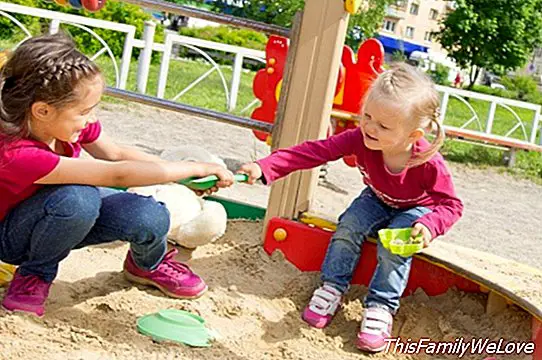Selfish children, how to help overcome the stage of mine, mine?

In company everything is more enjoyed, sharing is a very important value to instill in children. However, a very common scene in homes is to listen to the child refusing to share one of his toys with a friend or brother. The "mine, mine" is a phrase pronounced by many minors making their side look more selfish, a version of them that needs to be remedied.
Empathy and generosity It is a value to be taken into account in people and that can be taught to children through the instrument through which these teachings are best transmitted: education. These are some ways to transmit this value to children.
Teaching generosity to children
Since Baby Center A series of tips are given to teach generosity to the little ones:
- Sharing is fun. Children can have a great time while they share and to illustrate it, nothing better than team games in which several children work together to achieve a common goal. To do this they must contribute something to achieve this goal so that everyone contributes their grain of sand to conquer what is proposed,
- Do not punish your resistance to share. If the child sees that there are negative effects due to not sharing, he will only see a threat at this time and he will have even more rejection to this activity that will have negative consequences on him.
- When children fight over a toy, you have to help them discover what is really happening. His friend also has the right to try the fun he enjoys, so he can play with his toys too.
- Ask why he does not share, Maybe everything is due to fear because his partner steals the toy or breaks it. You have to reassure him and make him see that there is no danger.
Generosity makes us happy
A group of researchers from the University of Lübeck, Germany, found that generosity brings happiness to the individual through a mechanism in the brain of people that is activated when someone behaves in this way. A connection that makes those who are kind to those around them rewarded in their brain making them feel happier and fuller. One more reason to instill this value in children.
Those responsible for this work brought together a total of 50 participants who were divided into two random groups. Everyone is assigned 25 Swiss francs every seven days and for four weeks. Half of these volunteers were told that this money was to be spent on themselves. The rest he asked to be used in other people. The latter should detail in those who invested and in what.
After these four weeks, participants had passed to the second phase of the study where they had to make a decision in which they had to choose a person to make a gift. In the case of the second group it could not be the same individual in whom they had invested the money. While choosing, the researchers measured the changes that were produced in the brain through a functional magnetic resonance.
For this, the researchers presented them with several options that related benefits that were reported to other people and the cost involved, an investment ranging from 3 francs to 25. Those responsible for this work also measured the happiness level of the volunteers through a questionnaire and a brain scanner.
The results of both groups confirmed to the researchers that those who in the first phase of this work had used the money in other people were also the ones who made the most generous decisions in the second part. They also showed a greater increase in the feeling of happiness thanks to their generosity.
This is because those who chose the most generous decisions activated the temporal union varietal to a greater extent than the first group and modulated the connections between the two areas, the ventral striate and the parietal temporal junction in a different way. The feeling of reward It is more active in people who choose to behave well with the rest of their circle.
"Commitment works: When people commit to making a generous action, how to invest the money received in another person. The parietal temporal union plays an essential role in overcoming personal selfish motives, even if generosity has a cost for one, "explain those responsible for this research, who encourage to instill generosity in our day to day.
Damián Montero




